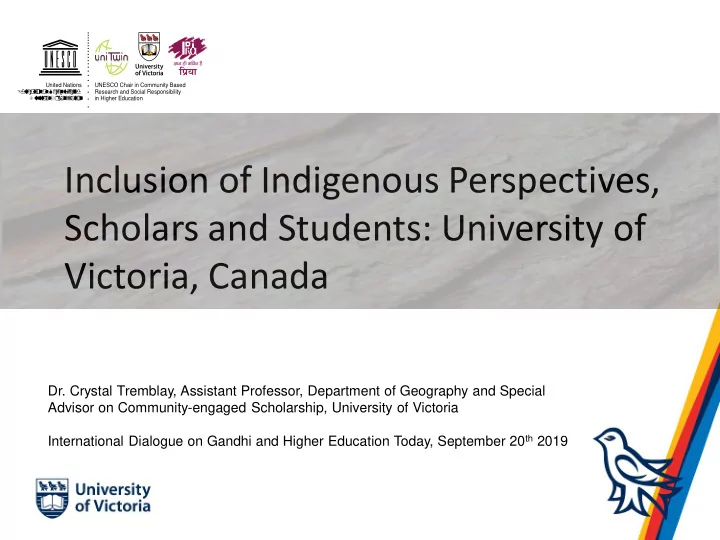

United Nations UNESCO Chair in Community Based E d u c a t i o n a l , Sc i e n t i f i c a n d Research and Social Responsibility Cu l t u r a l Or g a n i z a t i o n in Higher Education Inclusion of Indigenous Perspectives, Scholars and Students: University of Victoria, Canada Dr. Crystal Tremblay, Assistant Professor, Department of Geography and Special Advisor on Community-engaged Scholarship, University of Victoria International Dialogue on Gandhi and Higher Education Today, September 20 th 2019
WE ACKNOWLEDGE WITH RESPECT THE LEKWUNGEN PEOPLES ON WHOSE TRADITIONAL TERRITORY THE UNIVERSITY STANDS AND THE SONGHEES , ESQUIMALT AND WSÁNEĆ PEOPLES WHOSE HISTORICAL RELATIONSHIPS WITH THE LAND CONTINUE TO THIS DAY.
Principled Indigenous Research • Pursues community priorities Artist D. Thomas • Learn and honors community protocols and processes • Equitably distributes decision-making power • Accommodates the complexities and diversity of communities • Values relationships over projects – Invest time and money in building relationships • Allocates sufficient funds to indigenous communities and trainees • Honors diverse laws of ownership • Credits diverse knowledge systems • Acknowledges what can’t be shared - Dr. Charlotte Loppie, CIRCLE, University of Victoria
Acknowledging Indigenous Contributions to Epistemology What is knowledge – what is truth? We know in many ways – interdisciplinary We are all learners – participatory We are all teachers – reciprocal capacity building - Dr. Charlotte Loppie, CIRCLE, University of Victoria
PATHWAYS TO KNOWING WESTERN INDIGENOUS Research Topic-based Place-based Learning Institutions Relationships Environments Didactic Knowledge Experiential Systems Compartmentalized Holistic Worldview - Dr. Charlotte Loppie, CIRCLE, University of Victoria
Celebrating an epistemology of place ‘ decolonialisation is always contextualized within place, history and context’…”The theories and practices of CBPR with their focus on an epistemology of place have a significant role to play in the extraordinary project of decolonising our universities” (B. Hall, 2019) Holistic and relational Embracing the whole person – including spiritual connection to and relationships with land and non-human beings Land-based teachings, experiential and intergenerational Orientation to collective and action Commons, moving from ‘I’ to “we’ in all facets of life Global movement and non-violent protests for environmental justice
Reconciliation in Canada • History of colonization, assimilation and cultural genocide • Truth and Reconciliation Commission 92 Calls to Action – action 65 to grow the capacity of First Nations, Métis and Inuit communities to lead their own research and partner with the broader research community. • United Nations Declaration on the Rights of Indigenous Peoples (UN DRIP) Article 3 recognizes Indigenous peoples’ right to self - determination, which includes the right “to freely determine their political status and freely pursue their economic, social and cultural development.” • Decolonizing Higher Education
“Teachers in particular have a sacred responsibility to ensure that all their children, regardless of their heritage, are able to think about four key questions throughout their education: where do I come from, where am I going, why am I here, and most importantly, who am I? Education systems matter to us as humans, and should be designed to give a child answers to these very basic, yet profound, questions.” - Hon. Justice Senator Murray Sinclair, Peguis First Nation, Manitoba
Setting New Directions to Support Indigenous Research and Research Training in Canada - 2019- 2022 Four Strategic Directions: 1. Building relationships with First Nations, Inuit and Métis peoples 2. Supporting research priorities of indigenous peoples 3. Creating greater funding accessibility to granting agency programs 4. Championing indigenous leadership, self-determination and capacity building in research SSHRC: 25% of partnership research (PG) dedicated to indigenous-led
“ UVic recognizes that colonization and associated attitudes, policies and institutions have significantly changed Indigenous peoples’ relationship with this land. And for many years those same things served to exclude Indigenous students from higher education.” (Indigenous Plan)
Five key areas: 1. Students 2. Faculty and Staff 3. Education 4. Research 5. Governance
Indigenous Research and Leadership at UVic • Indigenous Academic and Community Engagement Office – Special Advisor Dr. Robina Thomas • Indigenous Academic Advisory Council (IAAC) – provides a forum for faculty and academic administrators to discuss existing, emerging and potential academic programs • Elders in residence program • Indigenous Cultural Acumen Training (ICAT)
Academic Units & Programs • Centre for Indigenous Research and Community-Led Engagement (CIRCLE) • The world’s first Indigenous law degree program - Joint Canadian Common Law and Indigenous Orders degree had its first intake of 26 students in September 2018. • The Indigenous Law Research Unit (ILRU) • More than 100 courses that include Indigenous content • 15 degree, diploma and certificate programs with an Indigenous specialization • The appointment of several Indigenous faculty and staff
Dr. Lorna Wanosts’a7 Williams, of the Lil’wat First Nation, Mount Currie Professor emeritus at the University of Victoria, and Canada Research Chair in Indigenous Knowledge and Learning in Education and Linguistics “Reconciliation means that Universities and Indigenous Communities must work together to find the ways to rebuild and reconcile Indigenous knowledge and Indigenous wisdom in the academy and in the communities. Finding the ways means learning from each other to communicate across the cultural differences and across the colonial relationships established by policies and practices.”
Recommend
More recommend